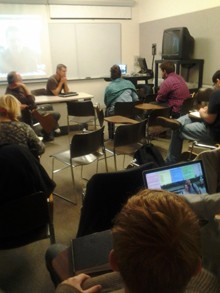
Sustainability in Senegal: UC Students Working to Design Bio-Fuel Motor and More
The University of Cincinnati is leading the way in sustainability through a multi-disciplinary effort that includes students and faculty from a variety of disciplines from the
College of Engineering and Applied Science
, the
Carl H. Lindner College of Business
,
McMicken College of Arts and Sciences
and the
College of Design, Architecture, Art, and Planning
.
That effort, the S-Project, is a two-year-long innovative, interdisciplinary, experiential learning and social-action course focused on enhancing the economic growth and success of a womens collaborative farm site located in Djilore (gee-lore), a village in Senegal, Africa, by developing a bio-fuel motor, a bio-fuel production system and a pilot farm site that demonstrates the growing, processing and oil extraction of the seeds of the Jatropha plant.
Funded by a grant from UC Forward, the S-Project is a series of four courses. The series of courses, which takes place over two years, includes two10-day trips to Senegal so that students may observe the culture and conditions of the Senegalese first hand.
Project facilitator Associate Professor Dale Murray explains, There will be two trips to Senegal one this December and another one next December. In this first phase, what weve really been doing is applying design-thinking, breaking down problems, and weve isolated different working groups on issues that have emerged and on which we feel we can make an impact, he said. Thats an important process to learn for the students: Heres this huge set of complex issues. How are we going to parse this out into doable chunks?
The deliverables of the course series and field study will provide
- a redesign of an engine used in the project
- a pilot farm proposal
- business and marketing plans
- grant proposals
- social media marketing tools
- portfolios and
- short documentary student films of the Senegal experience
As part of their senior capstone, mechanical-engineering-technology students James Anderson and Reece McNulty, with chemical-engineering student Charles Marxen, comprise the projects student engineering team. The team is working on the development of a bio-fuel motor to power implements and vehicles that can be used for four purposes transportation on land and water, tilling the soil, pumping water for irrigation and generating electricity. The students are also developing an exoskeleton.
The exoskeleton, which houses a five-horsepower diesel engine that is capable of powering an array of applications, allows for transport of the engine without damage while facilitating lifting heavy loads, harvesting crops with less back strain, and providing support throughout a work day. The team is working to optimize this and several other processes. Were building the exoskeleton to house [the engine], a pulley reduction system so you can change the output, RPM and torque [of the engine], and were also building an improved oil expeller for the Jatropha plant so that more oil can be harvested from the seeds.

Jatropha harvesting in Senegal.
The Jatropha plant, which is often used in Senegal as a live fence to protect crops from animals, can also be used to produce fuel. The oil from the seeds of the plant is extracted to produce bio-fuel to run the multi-use engines making the plant a relatively easy and inexpensive alternative to foreign oil dependency. Using the fuel that is produced from the seeds is also a way to increase farming efficiency.
Seeing how hard the Senegalese people work, day in and out, with little technology is amazing, said Anderson. If we could help optimize their working conditions, they could see a great spike in their productivity and have more freedom away from farming.
An important goal of the S-Project is to boost crop production and help preserve the ownership of family farms in the region with hopes of preserving local traditions and the Senegalese culture. According to project facilitator Dave Stefan, continuing to offer the S-Project is important to UC, as well.
To have the project sustainable within the university and to continue to build this relationship that we have with the group in Senegal is my hope for the project moving forward, he said. Its all developing, and were all kind of working together developing the vision for the project as part of the collaborative effort with students, faculty and Aywa International in Senegal.
Aywa International, a nonprofit agency in Senegal, is part of the collaboration with several outside constituents, including representatives from the World Bank, the Peace Corps and Open Road Productions, a local video-company.
Not unlike his colleague, Associate Professor Murray has high hopes for the S-Project. A trip to someplace like Senegal is life changing. Were recruiting; were training; were archiving; were figuring out what to do with the research weve gathered, he said. Its very complex, but its very rich and its so much better than sitting in a class and lecturing and taking a test. That really is the whole point.
Related Stories
UC education allowed couple to make mark on Cincinnati
April 24, 2024
As a native of Defiance, Ohio, John Deatrick, CEAS ’79, says arriving in Cincinnati to attend the University of Cincinnati in 1963 felt like landing in New York City.
Engineering student studying flight physics of birds
April 24, 2024
After earning a bachelor's degree in mechanical engineering in Nepal, Sameer Pokhrel came to the United States to further his education. From an early age, he had a lifelong fascination with aviation. As an adult, he transformed this fascination into a career, pursuing a doctoral degree in aerospace engineering at the University of Cincinnati's historic program. Here, he has succeeded in research, instruction, and was recently named Graduate Student Engineer of the Month by the College of Engineering and Applied Science.
The graduating class of 2024 shares creative works across 15...
April 24, 2024
DAAP’s Graduating Class of 2024 shares creative works across 15 interdisciplinary degree programs at DAAPworks.
